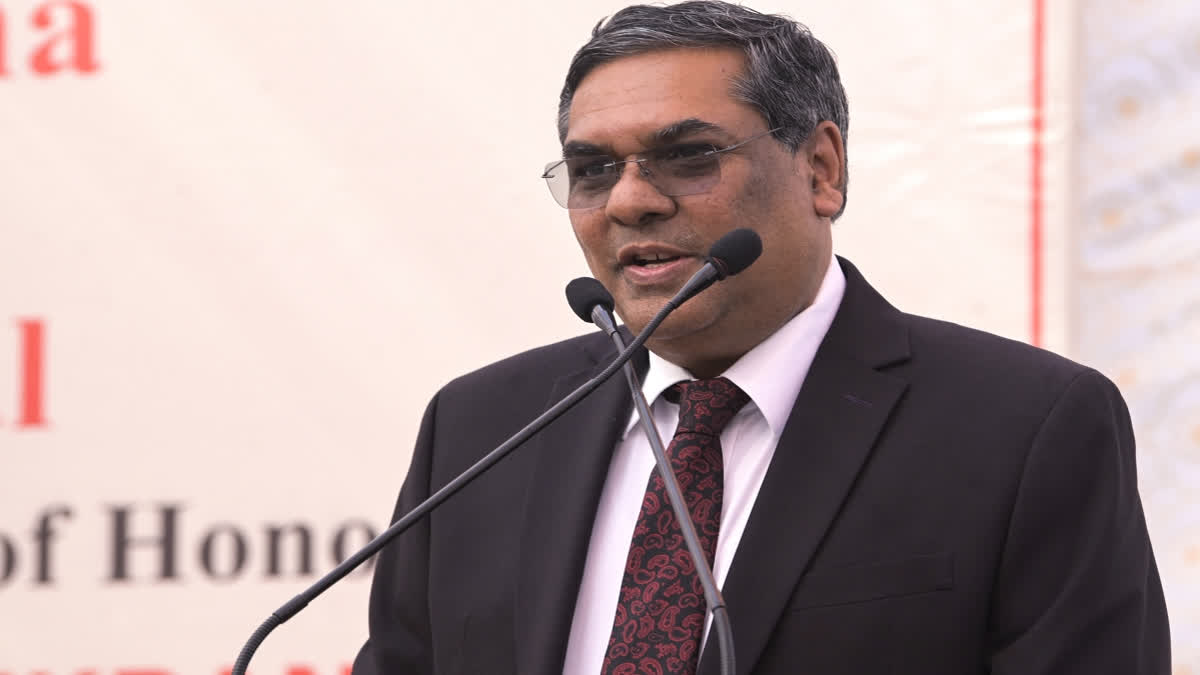New Delhi: Chief Justice of India Sanjiv Khanna on Tuesday said the government's each branch must honour its constitutionally-assigned distinct role while nurturing inter-institutional equilibrium.
He said India's courts are delivering justice at an exceptional pace, unmatched globally and stressed that there is a need to decriminalise laws, to ebb the inflow of undertrials to jails. The CJI stressed when properly understood, judicial independence serves not as a high wall but as a bridge - catalysing the flourishing of the Constitution, fundamental rights, and governance framework.
Speaking on the 75th Constitution Day celebrations held here, the CJI said critics sometimes question: How can an unelected judiciary justify its significant power in a democracy? But imagine a world where judges campaign for votes, solicit views and decisions from the public and make promises about future judgments.
He said this ensures that its decisions are unbiased, without affection or ill-will, free from external pressures and guided solely by the Constitution and the law, and, therefore it is said that the administration of justice is the firmest pillar of governance.
The CJI said: "Each branch of the government is not a satellite in an independent orbit but rather a related actor which works in a degree of separateness. There is interdependence, autonomy as well as reciprocity. Each branch must honour its constitutionally assigned distinct role while nurturing inter-institutional equilibrium".
The CJI highlighted certain areas of concern such as arrears and backlog of cases, delays, cost of litigation, access and lack of ease of access to justice, a large number of undertrial prisoners, and added, "the phenomenon of what I term as 'want of truth' or 'truth deficit'".
The CJI said this year alone, our judicial system has received over 2.08 crore cases in District Courts, around 16.6 lakh in High Courts, and around 54,000 in the Supreme Court. "Therefore, it is not surprising that about 4.54 crore cases are pending in the District Courts and 61.10 lakh cases are pending in the High Courts," he said.
He said the district courts have shown remarkable improvement in efficiency, particularly in civil matters. “The Case Clearance Rate – a key metric of judicial productivity – has risen steadily from 98.29% in 2022 to an impressive 101.74% in 2024. Last year alone, our district courts resolved over 20.14 lakh criminal and 8.09 lakh civil cases. The Supreme Court, too, has enhanced its performance, with our Case Clearance Rate climbing from 95% to 97%”, he said.
Prime Minister Narendra Modi, Union Law Minister Arjun Ram Meghwal, apex court judges Justices B R Gavai and Surya Kant, Attorney General R Venkataramani, Supreme Court Bar Association president and senior advocate Kapil Sibal also spoke at the event.
The CJI thanked the Centre for approving Rs. 7,210 crores for phase III of the e-Courts project, and added it ensures the judiciary is equipped to perform its core functions.
The CJI said two statistics reveal an insightful contrast in our judicial system: while the current prison population stands at around 5.23 lakh prisoners, our judicial workforce comprises just 19,213 judges and judicial officers at the district level and 751 judges in the High Courts. He said this vast disparity between those seeking justice and those tasked with dispensing it would typically forecast a paralysed system, and added yet, the data tells a different story.
The CJI said: "In 2022, despite an influx of 18 lakh new inmates, the judiciary facilitated the release of around 15 lakh prisoners, out of which three lakh undertrials were released within their first year, achieving a 69% release rate. The 2024 data further highlights this efficiency: by November 24, courts had released 5.38 lakh prisoners, surpassing the 5.29 lakh new admissions”.
“These figures demonstrate that, even with a limited judicial workforce, India’s courts are delivering justice at an exceptional pace, unmatched globally. There is a need to decriminalise laws, to ebb the inflow of undertrials to jails," he said.
He said the foremost duty of judges was towards the public and being open and transparent was the judiciary's biggest strength. "As adjudicators, we eschew any sense of being beyond reproach. In being responsive to constructive feedback, our courts become more efficient, citizen and public-centric, and accountable. By opening ourselves to scrutiny, we can identify systemic inefficiencies and bottlenecks, and work towards eliminating them," he said.



